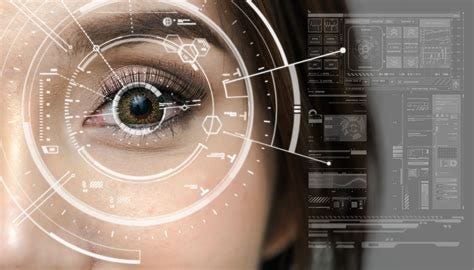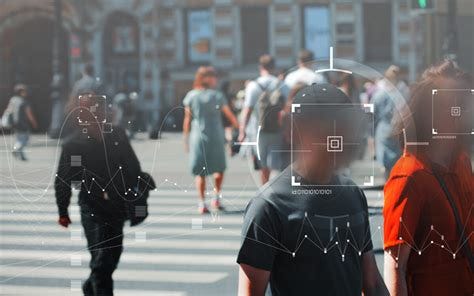
The reality of living in a total surveillance state is no longer a dystopian future—it’s already here, and it has crept in slowly, right under our noses. Governments, corporations, and AI systems have gradually woven themselves into our daily lives through the devices and platforms we rely on the most. Social media, smartphones, and AI-powered algorithms have become the ultimate tools for surveillance, tracking us more intimately than ever before. One of the latest signs of this growing surveillance state? The new Apple update, which could give unprecedented access to your biometrics—without you even realizing it.

The Slow Creep of the Surveillance State
The world didn't wake up one day to find itself in a surveillance state. Instead, it happened incrementally. First, it was the introduction of social media platforms like Facebook and Twitter, which asked for a few details: your name, your interests, your friends. It seemed harmless. Over time, the data we shared expanded, from our location check-ins to every click and like, to the conversations we have in private messages. And it wasn’t just social media—our smartphones began recording our steps, mapping our locations, and keeping tabs on our heart rates. All of this was done in the name of convenience.

Now, with the integration of AI, all of this data is not just being collected but actively analyzed to form detailed profiles of individuals’ behaviors, thoughts, and movements. The government, through initiatives like Project Odin, and private companies are leveraging this data to track and predict our every move. The surveillance state is no longer about watching; it’s about controlling—and most of us didn’t see it coming.
The Latest Apple Update: A New Era of Biometrics
Apple, long seen as a champion of privacy, is now part of this growing surveillance web. The latest iPhone update introduces new capabilities for tracking biometric data, including your eye movements, facial expressions, and potentially much more.
As the tech giant moves forward with these updates, your iPhone might soon become the most advanced surveillance device in your pocket.
What’s New in Apple's Update?
Eye Tracking and Facial Recognition: The most notable change in Apple's recent updates is its ability to track eye movement and facial expressions. On the surface, this is being marketed as a feature for augmented reality (AR) apps or to improve accessibility functions for users. However, these capabilities give Apple, and potentially third parties with access to this data, an intimate look at what you’re paying attention to, how you react emotionally, and even whether you’re lying.
Biometric Data: Your phone is already equipped with various biometric sensors, from facial recognition to fingerprint scanning, but this update expands what can be tracked. Apple is beginning to move into advanced biometrics—eye movements are just the start. Soon, sensors may be able to analyze subtle changes in skin temperature, pupil dilation, and even micro-expressions to gather psychological and emotional data. Essentially, your phone will be able to tell more about what you’re feeling than you consciously express.
Location Tracking and Beyond: Apple already tracks your location through GPS, Wi-Fi, and cell towers, allowing it to know where you are at all times. This data is used for features like Find My iPhone or to provide location-based services, but it's also being stored in a way that could be used by governments or advertisers. The concern here is that most people aren’t aware of the extent to which they’re being tracked. This isn't just about your current location—it’s about building a profile of where you go, how often, and with whom.
Does the iPhone Track EEG or Other Advanced Biometrics?
While there is evidence that special iPhones can track EEG (brainwave) activity, Apple’s trajectory suggests that more advanced biometrics are on the horizon. This technology does exist. EEG tracking on iPhones can allow for real-time monitoring of your brain activity, which could reveal a lot about your mood, thoughts, and mental health. Although EEG tracking isn't currently part of the iPhone’s capabilities, the line between privacy and personal data is already thin, and the next generation of biometric sensors might not be far behind. The question is: why does your phone need to track this much about you?
Why Is Apple Collecting All This Data?
Apple, like many tech giants, argues that this data is used to improve the user experience. For instance, tracking eye movements can enhance augmented reality, and facial recognition makes it easier to unlock your phone securely. But beyond these consumer-facing features, the real answer lies in two words: data power. The more Apple (and by extension, governments and corporations) knows about you, the more valuable that data becomes.

Here’s how this data might be used:
For Targeted Advertising: Advertisers crave biometric data because it reveals what you’re really interested in. If your phone tracks your eye movements or facial expressions, it can analyze which ads catch your attention or which ones you skip over. This gives advertisers a direct look at your subconscious preferences.
For Law Enforcement and Governments: While Apple has pushed back against government demands for data in the past, the reality is that biometric data could eventually be accessed by authorities. Surveillance systems powered by AI, like those potentially under a Project Odin-type framework, could tap into this data to monitor citizens in real time. Your movements, your expressions, even your emotional state could be flagged if the algorithms decide you're a potential threat.
For Behavioral Profiling: Imagine your phone building a psychological profile based on your biometrics. From how often your eyes dart to certain parts of the screen to subtle changes in your facial muscles, AI could determine how you’re feeling, what you're thinking, and even predict how you’ll behave. This isn’t far-fetched—companies and governments are already exploring these possibilities.

The iPhone Knows Where You Are—At All Times
Apple's location tracking isn’t new, but its implications are increasingly worrying. Your phone knows where you are at all times, and unless you manually disable location services (which many apps require to function), your movements are constantly being logged. Even without GPS, your phone can track you via nearby Wi-Fi networks or cell towers.

Why does this matter? Because this data, when paired with other biometrics, paints a complete picture of your life. Where you go, what you do, who you meet—all of this becomes data that can be analyzed by AI systems. Whether it’s for personalized ads, political monitoring, or predictive policing, location data is a key tool in the surveillance state.

Why Should We Be Concerned?
It’s one thing for your phone to help you navigate, keep track of your steps, or even unlock with a glance. But it’s another when these capabilities turn into tools of surveillance that track your movements, biometrics, and potentially even your thoughts—often without your full understanding or consent.
The truth is, most people don’t fully realize how much data they’re giving away simply by owning a smartphone, using social media, or living in an increasingly connected world. With AI driving much of this data collection and analysis, we’ve entered an era where the government, big tech, and corporations know more about us than we do. The surveillance state isn't just coming—it’s here. And with each update, each feature, and each “innovation,” we give up a little more privacy, often without even knowing it.









If you have a smartphone, you might as well be wearing an ankle monitor.
thanks for the warning. I have a cell phone but it is barely ever on, only to contact overseas family. I want nothing in my house smarter than myself. Well, may be my dog is LOL